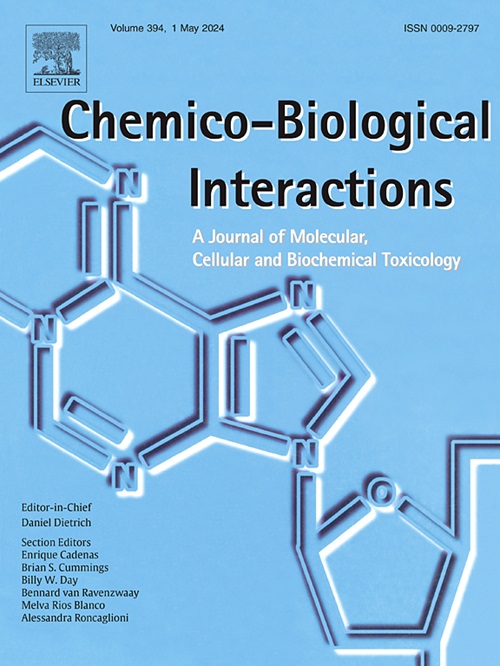塞来昔布阻断AKT/ yaps127a驱动的肝内胆管癌中AKT/mTOR,激活p21/p27阻滞周期,抑制Mcl-1凋亡。
IF 5.4
2区 医学
Q1 BIOCHEMISTRY & MOLECULAR BIOLOGY
引用次数: 0
摘要
肝内胆管癌(iCCA)是一种发病隐匿、治疗有限、预后差的恶性肝脏肿瘤。最近的研究表明,塞来昔布对胆管癌细胞系具有显著的细胞毒性作用,表明其作为iCCA治疗的潜力。然而,将塞来昔布治疗与其毒理学结果联系起来的潜在分子和细胞机制仍不清楚。在本研究中,我们通过过表达AKT和YapS127A(以下简称AKT/YapS127A)诱导小鼠iCCA,并持续给药塞来昔布,在体内评估其抗肿瘤作用。结果表明,塞来昔布能有效抑制AKT/ yaps127a驱动的iCCA小鼠的肿瘤生长。在机制上,塞来昔布提高了细胞周期抑制剂p21Waf1/Cip1和p27Kip1的水平,导致细胞周期阻滞。它还通过下调抗凋亡蛋白Mcl-1和Bcl-2的表达促进细胞凋亡。这些作用与AKT/mTORC1信号通路的调节有关。一致地,塞来昔布在iCCA细胞系中再现了AKT/mTORC1抑制和随后的细胞周期/凋亡调节因子改变。总的来说,我们的研究阐明了塞来昔布在iCCA中发挥抗肿瘤作用的分子机制,证明了其通过精确调控AKT/mTORC1通路诱导细胞毒性结果的能力。这些发现加深了对塞来昔布毒理学作用的理解,并为开发靶向iCCA治疗提供了重要见解。本文章由计算机程序翻译,如有差异,请以英文原文为准。
Celecoxib blocks AKT/mTOR in AKT/YapS127A-driven intrahepatic cholangiocarcinoma, activating p21/p27 for cycle arrest and suppressing Mcl-1 for apoptosis
Intrahepatic cholangiocarcinoma (iCCA) is a malignant liver tumor with insidious onset, limited treatments, and poor prognosis. Recent studies have shown that celecoxib exerts marked cytotoxic effects on cholangiocarcinoma cell lines, suggesting its potential as an iCCA therapy. However, the potential molecular and cellular mechanisms that link celecoxib treatment to its toxicological outcomes remain unclear. In this study, we induced iCCA in mice by overexpressing AKT and YapS127A (hereafter referred to as AKT/YapS127A) and administered celecoxib continuously to evaluate its antitumor effects in vivo. The results demonstrated that celecoxib effectively inhibited tumor growth in AKT/YapS127A-driven iCCA mice. Mechanistically, celecoxib boosted levels of cell cycle inhibitors p21Waf1/Cip1 and p27Kip1, leading to cell cycle arrest. It also promoted apoptosis by downregulating the expression of anti-apoptotic proteins Mcl-1 and Bcl-2. These effects were associated with the modulation of the AKT/mTORC1 signaling pathway. Consistently, celecoxib recapitulated AKT/mTORC1 inhibition and subsequent cell cycle/apoptotic regulator alterations in iCCA cell lines. Collectively, our study elucidated the molecular mechanisms through which celecoxib exerted its anti-tumor effects in iCCA, demonstrating its capacity to induce cytotoxic outcomes via the precise regulation of the AKT/mTORC1 pathway. These findings deepen understanding of the toxicological actions of celecoxib and provide critical insights for developing targeted iCCA therapies.
求助全文
通过发布文献求助,成功后即可免费获取论文全文。
去求助
来源期刊
CiteScore
7.70
自引率
3.90%
发文量
410
审稿时长
36 days
期刊介绍:
Chemico-Biological Interactions publishes research reports and review articles that examine the molecular, cellular, and/or biochemical basis of toxicologically relevant outcomes. Special emphasis is placed on toxicological mechanisms associated with interactions between chemicals and biological systems. Outcomes may include all traditional endpoints caused by synthetic or naturally occurring chemicals, both in vivo and in vitro. Endpoints of interest include, but are not limited to carcinogenesis, mutagenesis, respiratory toxicology, neurotoxicology, reproductive and developmental toxicology, and immunotoxicology.

 求助内容:
求助内容: 应助结果提醒方式:
应助结果提醒方式:


